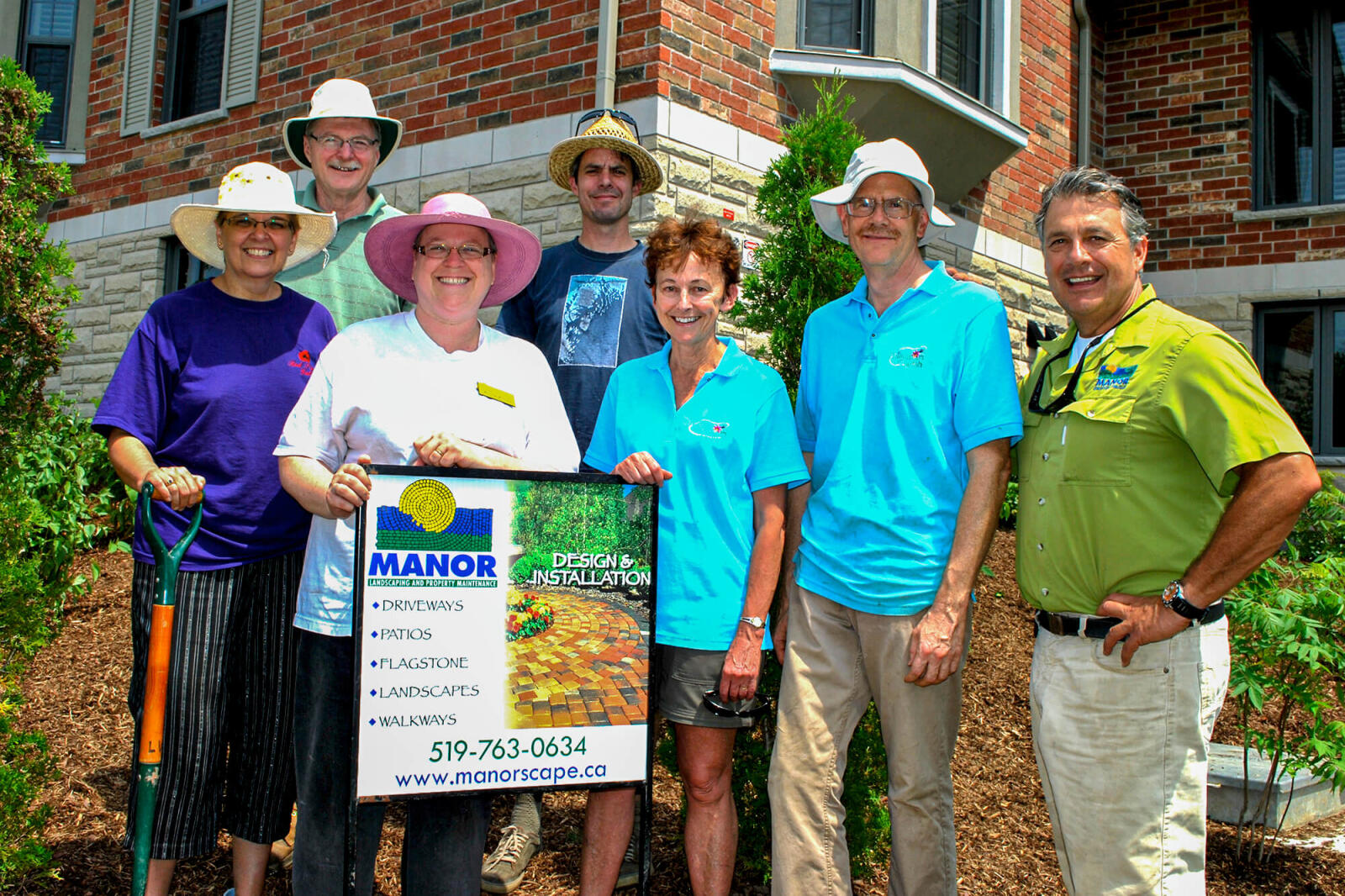February 15, 2013

Volunteers praise Carlo Mann (right), owner of Manor Landscaping, for his support to beautify the grounds at the Guelph hospice.
LO member helps Guelph hospice beautify grounds
Two Guelph area charities, Pollination Guelph and Hospice Wellington, are eagerly anticipating the arrival of spring 2013, when everyone may enjoy the beautiful, pollinator garden planted earlier last fall on the hospice site in Guelph.
Designed by Pollination Guelph, the garden replaces an area of steeply sloped and weed-prone grass that is visible from the facility’s patio and sunroom. Volunteers with Pollination Guelph and Hospice Wellington planted over 300 perennials and flowering shrubs chosen to attract and provide food and habitat for pollinating insects such as butterflies and bees.
The perennial garden is the second phase of a multi-phase project at the hospice.
“Here, within the Hospice, we strive to create a positive and life-affirming atmosphere as part of end-of-life care,” says Hospice executive director Rosslyn Bentley. “When Pollination Guelph first proposed the project to us, we realized that it would give us the opportunity to create an environment around our facility that really reflects these values. We are delighted with the results so far and really looking forward to watching the gardens grow and mature over the coming years.”
The first phase of the project, completed in the spring of 2012, saw the installation of a native shrub garden which replaced another area of steeply sloped. The garden will be extended in 2013 as part of the third phase of the project. It will include creating a border of native shrub roses around the parking lot and an art installation.
The first two phases of the project were completed with the support not only of the Guelph Community Foundation, but also member of Landscape Ontario, Manor Landscaping and Maintenance of Guelph. The company maintained the landscaping around the Hospice, free of charge since the facility opened in 2010. When Carlo Mann, owner of Manor Landscaping learned of the proposal to re-landscape the site, he immediately offered additional help from his company.
“Maintaining healthy grass on such a hot, exposed and sloped site was an on-going challenge. The advantages of the project were obvious. Not only will there be much less grass to cut and care for, but the gardens will bring colour and interest, as well as providing habitat for insects and birds,” said Mann.
The company donated mulch and topsoil for the project, helped with the cost of plants and donated the time of work crews to strip sod and prepare the ground for a shrub garden. The crew from Manor also worked alongside volunteers planting the shrub garden.
Pollination Guelph volunteer Clare Irwin noted, “The help we received from Manor Landscaping was invaluable. Pollination Guelph does not own a truck or any landscaping machinery. Manor Landscaping not only gave financial support to the project but also essential practical help with transporting materials to the site and sod stripping.”
The Hospice Wellington garden is one of several planting projects undertaken by Pollination Guelph as part of its mandate to conserve and develop habitat for butterflies, bees and other pollinating insects.
Designed by Pollination Guelph, the garden replaces an area of steeply sloped and weed-prone grass that is visible from the facility’s patio and sunroom. Volunteers with Pollination Guelph and Hospice Wellington planted over 300 perennials and flowering shrubs chosen to attract and provide food and habitat for pollinating insects such as butterflies and bees.
The perennial garden is the second phase of a multi-phase project at the hospice.
“Here, within the Hospice, we strive to create a positive and life-affirming atmosphere as part of end-of-life care,” says Hospice executive director Rosslyn Bentley. “When Pollination Guelph first proposed the project to us, we realized that it would give us the opportunity to create an environment around our facility that really reflects these values. We are delighted with the results so far and really looking forward to watching the gardens grow and mature over the coming years.”
The first phase of the project, completed in the spring of 2012, saw the installation of a native shrub garden which replaced another area of steeply sloped. The garden will be extended in 2013 as part of the third phase of the project. It will include creating a border of native shrub roses around the parking lot and an art installation.
The first two phases of the project were completed with the support not only of the Guelph Community Foundation, but also member of Landscape Ontario, Manor Landscaping and Maintenance of Guelph. The company maintained the landscaping around the Hospice, free of charge since the facility opened in 2010. When Carlo Mann, owner of Manor Landscaping learned of the proposal to re-landscape the site, he immediately offered additional help from his company.
“Maintaining healthy grass on such a hot, exposed and sloped site was an on-going challenge. The advantages of the project were obvious. Not only will there be much less grass to cut and care for, but the gardens will bring colour and interest, as well as providing habitat for insects and birds,” said Mann.
The company donated mulch and topsoil for the project, helped with the cost of plants and donated the time of work crews to strip sod and prepare the ground for a shrub garden. The crew from Manor also worked alongside volunteers planting the shrub garden.
Pollination Guelph volunteer Clare Irwin noted, “The help we received from Manor Landscaping was invaluable. Pollination Guelph does not own a truck or any landscaping machinery. Manor Landscaping not only gave financial support to the project but also essential practical help with transporting materials to the site and sod stripping.”
The Hospice Wellington garden is one of several planting projects undertaken by Pollination Guelph as part of its mandate to conserve and develop habitat for butterflies, bees and other pollinating insects.